3.1- General Definition of Psychology
1/18
Earn XP
Description and Tags
Introduction to Psychology: (pp. 27-29)
Name | Mastery | Learn | Test | Matching | Spaced |
|---|
No study sessions yet.
19 Terms
Answer: B) The scientific study of behavior and mental processes
Explanation:
Modern psychology is commonly defined as the scientific study of behavior and mental processes, which includes both observable actions and internal experiences.
Source: (p. 27)
What is the general definition of psychology as presented in Western textbooks?
A) The philosophical study of the soul and spirit
B) The scientific study of behavior and mental processes
C) The religious interpretation of human nature
D) The study of moral and ethical values
——————————————————————————————
Keywords:
1- General definition: التعريف العام، پێناسەی گشتی
2- Western textbooks: الكتب المدرسية الغربية، کتێبی خوێندنی ڕۆژئاوا
2- The philosophical study of the soul and spirit:
الدراسة الفلسفية للروح والنفس، لێکۆڵینەوەی فەلسەفیانەی ڕۆح و ڕۆح
3- The scientific study of behavior and mental processes:
الدراسة العلمية للسلوك والعمليات العقلية، لێکۆڵینەوەی زانستی لە ڕەفتار و پرۆسەی دەروونی
4- The religious interpretation of human nature:
التفسير الديني للطبيعة البشرية، لێکدانەوەی ئایینی بۆ سروشتی مرۆڤ
5- The study of moral and ethical values:
- دراسة القيم الأخلاقية والمهنية
- لێکۆڵینەوە لە بەها ئەخلاقی و ئەخلاقییەکان
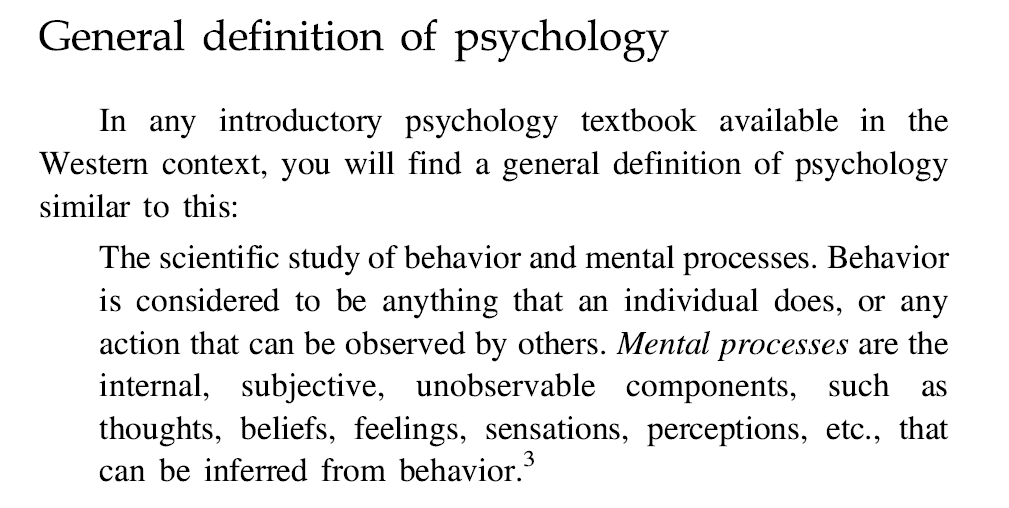
Answer: B) Anything that an individual does that can be observed
Explanation:
Behavior is defined as any action that can be observed by others.
Source: (p. 27)
According to this definition, “behavior” refers to:
A) Only thoughts and beliefs
B) Anything that an individual does that can be observed
C) Unobservable feelings
D) The moral choices a person makes
——————————————————————————————
Keywords:
1- According to this definition: وفقًا لهذا التعريف، بەپێی ئەم پێناسەیە
2- “behavior” refers to: يشير "السلوك" إلى، "ڕەفتار" ئاماژەیە بۆ
3- Belief: معتقد، بيروباوەڕ
4- Beliefs: المعتقدات، بیروباوەڕ
5- Core Beliefs: المعتقدات الأساسية (المعتقدات الجوهرية)، بیروباوەڕی سەرەکی
6- Anything that an individual does that can be observed:
- أي شيء يقوم به الفرد ويمكن ملاحظته
- هەر شتێک کە تاکێک ئەنجامی بدات کە دەتوانرێت چاودێری بکرێت
7- Unobservable feelings:
- المشاعر غير الملحوظة (المشاعر غير القابلة للملاحظة)
- هەستی چاودێرنەکراو
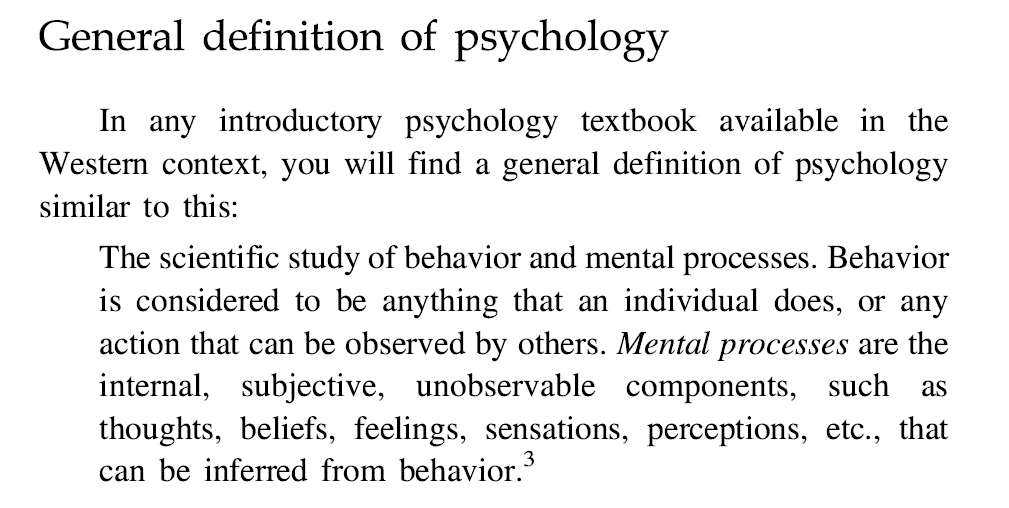
Answer: D) Worship
Explanation:
The goals of psychology are to describe, explain, predict, and control behavior and mental processes. Worship is outside the scope of empirical psychology.
Which of the following is NOT one of the four general goals of psychology?
A) Describe
B) Explain
C) Predict
D) Worship
——————————————————————————————
Keywords:
1- Which of the following is NOT one of the four general goals of psychology?:
- أيٌّ مما يلي ليس واحدًا من الأهداف الأربعة العامة لعلم النفس؟
- کام لەمانەی خوارەوە یەکێک نییە لە چوار ئامانجی گشتی دەروونناسی؟
2- Describe: الوصف، وەسفكردن
3- Explain: الشرح، ڕوونكردنەوە
4- Interpret: تفسير، لێكدانەوە
5- Predict: التوقع، پێشبينيكردن
6- Worship: العبادة، پەرستن
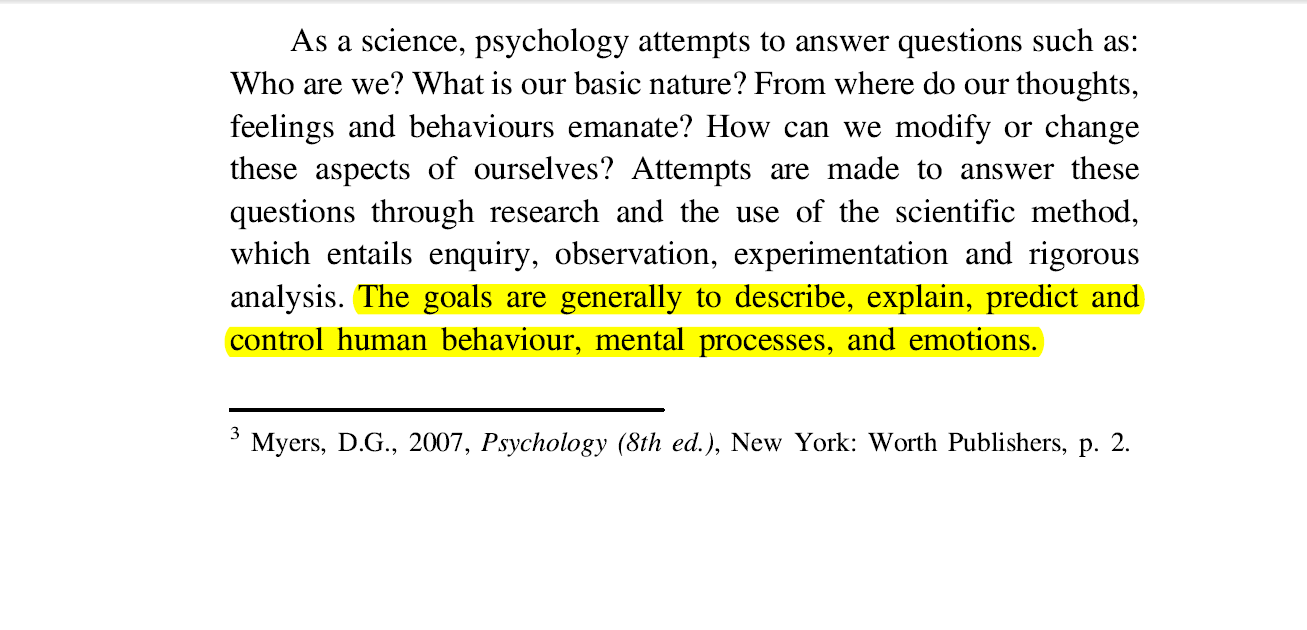
Answer: B) Disregards the soul
Explanation:
“One of the main weaknesses of contemporary psychology has been its disregard for the most important part of the human being - the soul.” A key critique is that modern psychology tends to focus on biological, behavioral, and social aspects, largely ignoring the soul, which is central in Islamic thought.
Source: (p. 28)
——————————————————————————————
- "Contemporary" refers to modern or current psychology—the field as it exists and is practiced today.
"Non-human behavior" refers to studying animals (e.g., in behavioral psychology)
One criticism of contemporary psychology from an Islamic perspective is that it:
A) Places too much emphasis on the afterlife
B) Disregards the soul
C) Overemphasizes religious doctrines
D) Studies only non-human behavior
——————————————————————————————
Keywords:
1- One criticism of contemporary psychology from an Islamic perspective is that it:
- أحد الانتقادات الموجهة إلى علم النفس المعاصر من منظور إسلامي هو أنه
- یەکێک لە ڕەخنەکان لە دەروونناسی هاوچەرخ لە ڕوانگەی ئیسلامییەوە ئەوەیە کە
2- Places too much emphasis on the afterlife:
- يركز بشكل مفرط على الحياة الآخرة
- زۆر جەخت لەسەر ژیانی دوای مردن دەکاتەوە
3- Disregards the soul: يتجاهل (يُهمل) الروح، ڕۆح پشتگوێ دەخات
4- Overemphasizes religious doctrines:
يبالغ في التركيز على العقائد الدينية، زۆر جەخت لەسەر عەقیدەی ئایینی دەکاتەوە
5- Studies only non-human behavior:
- يدرس سلوك الكائنات غير البشرية فقط
- تەنها لە هەڵسوکەوتی زیندەوەرە غەیرە مرۆییەکان دەکۆڵێتەوە.
Answer: C) Study of the soul or spirit
Explanation:
“Psyche” means soul or spirit, and “logos” means study, so originally it referred to the study of the soul.
Source: (p. 28)
The origin of the word “psychology” comes from Greek words meaning:
A) Study of behavior and society
B) Study of the body and health
C) Study of the soul or spirit
D) Study of the brain and nerves
——————————————————————————————
Keywords:
1- The origin of the word “psychology” comes from Greek words meaning:
- أصل كلمة "علم النفس" مشتق من كلمات يونانية تعني
- سەرچاوەی وشەی “دەروونناسی” لە وشەی یۆنانییەوە هاتووە کە بە واتای
2- Study of behavior and society:
دراسة السلوك والمجتمع، لێکۆڵینەوە لە ڕەفتار و کۆمەڵگا
3- Study of the body and health:
دراسة الجسد والصحة، لێکۆڵینەوە لە جەستە و تەندروستی
4- Study of the soul or spirit:
دراسة النفس أو الروح، لێکۆڵینەوە لە ڕۆح یان ڕۆح
5- Study of the brain and nerves:
دراسة الدماغ والأعصاب، لێکۆڵینەوە لە مێشک و دەمارەکان
6- Soul: نفس، ڕۆح
7- Spirit: روح، ڕۆح
Answer: B) Less likely to believe in God
Explanation:
Research shows psychologists are generally less religious than the population they serve, less likely to believe in God, pray, or be part of religious communities.
Source: (p. 29)
Compared to the general population, psychologists in the United States are:
A) More likely to be deeply religious
B) Less likely to believe in God
C) Equally likely to attend worship services
D) More likely to belong to religious congregations
——————————————————————————————
Keywords:
1- Compared to the general population:
- (مقارنةً بعامة الناس) بالمقارنة مع عامة السكان
بە بەراورد لەگەڵ دانیشتوانی گشتی
2- Psychologists: علماء النفس، دەروونناسەكان
3- More likely: اكثر احتمالا، ئەگەری زیاترە
4- More likely to belong to religious congregations:
- أكثر ميلاً للانتماء إلى جماعات دينية
- ئەگەری زیاترە سەر بە جەماعەتە ئاینییەکان بێت
5- religious communities: المجتمعات الدينية، کۆمەڵگە ئاینییەکان
6- Research shows:
تُظهر (تشير) الأبحاث، توێژینەوەکان دەریدەخەن
Answer: B) Spiritual but not religious
Explanation:
“Spiritual but not religious” (SBNR) refers to those who consider themselves spiritual in a broad, personal sense without adherence to formal religion.
Source: (p. 29)
What term is often used to describe people who value personal meaning but do not necessarily follow organized religion?
A) Theists
B) Spiritual but not religious
C) Agnostics
D) Ritualists
——————————————————————————————
Keywords:
1- What term is often used to describe people who value personal meaning but do not necessarily follow organized religion?
- ما المصطلح الذي يُستخدم غالبًا لوصف الأشخاص الذين يهتمون بالمعنى الشخصي لكنهم لا يتبعون بالضرورة ديانة منظمة؟
- زۆرجار چ زاراوەیەک بۆ وەسفکردنی ئەو کەسانە بەکاردەهێنرێت کە مانای کەسی بە نرخ دەزانن بەڵام مەرج نییە پەیڕەوی لە ئایینی ڕێکخراو بکەن؟
2- Theists: مؤمنون بالله (ثيئيون)، تییستەکان
3- Spiritual but not religious: روحانيون لكن غير متدينين، ڕۆحی بەڵام ئاینی نییە
4- Agnostics: لاأدريون، ئەگنۆستیکەکان
5- Ritualists: طقوسيون، ڕێوڕەسمەکان
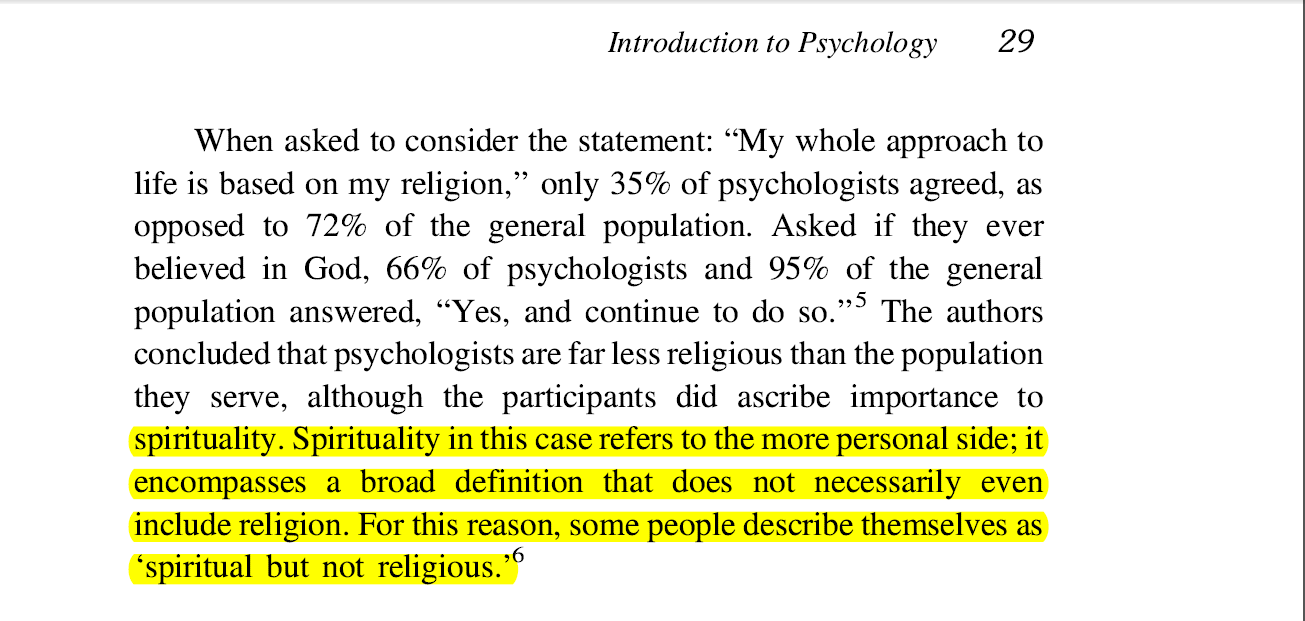
Answer: B) Internal, subjective experiences such as thoughts and feelings
Explanation:
Mental processes include internal phenomena such as thoughts, feelings, perceptions, which are inferred from behavior.
"Inferred" means we guess or figure out what someone is thinking or feeling by watching what they do.
Example:
You see your friend smiling and laughing.
You infer they are happy (even though you can’t see their happiness directly inside their mind).
So:
Behavior: Smiling and laughing (you can see this).
Mental process: Feeling happy (you can’t see this, so you infer it).
That’s what “inferred from behavior” means: we figure out the hidden thoughts or feelings by looking at what people do.
Source: (p. 27)
In psychological research, mental processes typically refer to:
A) Observable actions
B) Internal, subjective experiences such as thoughts and feelings
C) Genetic inheritance
D) Societal structures
——————————————————————————————
Keywords:
1- In psychological research, mental processes typically refer to:
- في البحث النفسي، تشير العمليات العقلية عادةً إلى
- لە توێژینەوە دەروونییەکان، پرۆسەی دەروونی بە شێوەیەکی گشتی ئاماژەن بۆ
2- Observable actions: الأفعال الملحوظة، کردارە چاودێرکراوەکان
3- Internal, subjective experiences such as thoughts and feelings:
- الخبرات الداخلية الذاتية مثل الأفكار والمشاعر
- ئەزموونە ناوخۆیی و بابەتییەکان وەک بیرکردنەوە و هەستەکان
4- Genetic inheritance: الوراثة الجينية، بۆماوەیی بۆماوەیی
5- Societal structures: البُنى الاجتماعية، پێکهاتە کۆمەڵایەتییەکان
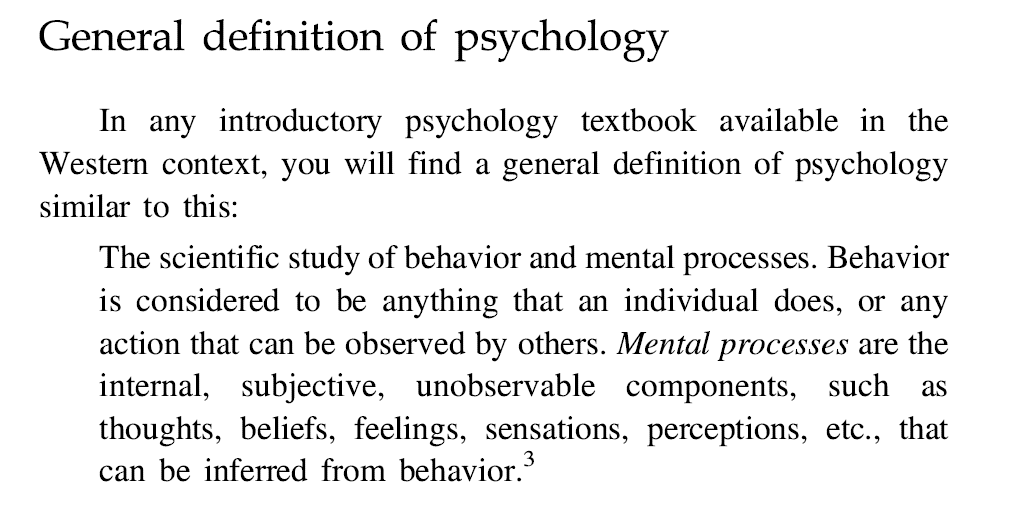
Answer: B) About 35%
Explanation:
Only 35% of psychologists agreed with that statement, compared to 72% of the general population.
Source: (p. 29)
In the study comparing psychologists to the general US population, what proportion of psychologists agreed with: “My whole approach to life is based on my religion”?
A) About 10%
B) About 35%
C) About 72%
D) About 95%
——————————————————————————————
Keywords:
1- In the study comparing psychologists to the general US population, what proportion of psychologists agreed with: “My whole approach to life is based on my religion”?:
- في الدراسة التي قارنت علماء النفس بعامة سكان الولايات المتحدة، ما نسبة علماء النفس الذين وافقوا على: "نهجي في الحياة مبني على ديني"؟
- لە توێژینەوەکەدا کە دەروونناسەکان بە دانیشتوانی گشتی ئەمریکا بەراورد دەکات، چ ڕێژەیەکی دەروونناسان هاوڕا بوون لەگەڵ ئەوەی کە دەڵێت: "هەموو ڕێبازی من بۆ ژیان لەسەر بنەمای ئایینەکەم دامەزراوە"؟
2- About 35%: حوالي ٣٥٪، نزیکەی (٣٥٪)
3- Some psychologists agreed with that statement:
- بعض علماء النفس وافقوا على تلك العبارة
- هەندێک لە دەروونناسەکان لەگەڵ ئەو لێدوانەدا هاوڕان
Answer: C) 66%
Explanation:
66% of psychologists answered they believed in God and still do, compared to 95% of the general population.
Source: (p. 29)
According to the same data, what percent of psychologists said they ever believed in God and continue to do so?
A) 16%
B) 25%
C) 66%
D) 95%
——————————————————————————————
Keywords:
1- According to the same data, what percent of psychologists said they ever believed in God and continue to do so?:
- وفقًا لنفس البيانات، ما هي النسبة المئوية للأخصائيين النفسيين الذين قالوا إنهم كانوا يؤمنون بالله في أي وقت ولا يزالون يؤمنون به حتى الآن؟
- بەپێی هەمان داتا، لەسەدا چەندی دەروونناسان وتوویانە سەردەمانێک باوەڕیان بە خودا هەبووە و تا ئێستاش باوەڕیان پێی هەیە؟
2- 66% of psychologists answered they believed in God and still do, compared to 95% of the general population:
- أجاب ٦٦٪ من علماء النفس أنهم يؤمنون بالله وما زالوا يؤمنون به، مقارنةً بـ ٩٥٪ من عامة السكان (عامة الناس)
- 66%ی پسپۆڕانی دەروونناس وەڵامیان داوەتەوە کە باوەڕیان بە خودا هەیە و هێشتا باوەڕیان پێی هەیە، بە بەراورد بە 95%ی دانیشتوانی گشتی (خەڵکی گشتی)
Answer: B) Included prominent discussions about the soul
Explanation:
Historically, psychology included significant exploration of the soul or spirit, especially before the clear division between science and religion.
Source: (p. 28)
Before the separation of science and religion, the study of psychology:
A) Completely ignored metaphysical topics
B) Included prominent discussions about the soul
C) Focused only on laboratory experiments
D) Was limited to studying animal behavior
——————————————————————————————
Keywords:
1- Before the separation of science and religion, the study of psychology:
- قبل انفصال العلم عن الدين، كانت دراسة علم النفس
- پێش جیابوونەوەی زانست و ئایین، لێکۆڵینەوەی دەروونناسی
2- Completely ignored metaphysical topics:
- تتجاهل تمامًا المواضيع الميتافيزيقية
- بەتەواوی بابەتەکانی میتافیزیکی پشتگوێ دەخات
3- Included prominent discussions about the soul:
- تشمل مناقشات بارزة حول الروح
- باسی دیار لەبارەی ڕۆح لەخۆدەگرێت
4- Focused only on laboratory experiments:
- تركز فقط على التجارب المخبرية
- تەرکیز تەنها لەسەر تاقیکردنەوە تاقیگەییەکان بێت
5- Was limited to studying animal behavior:
- اقتصرت على دراسة سلوك الحيوان
- سنووردار بوو بە لێکۆڵینەوە لە ڕەفتاری ئاژەڵان
Answer: B) Neglecting the soul and producing incomplete theories of human nature
Explanation:
The critique is that psychology focuses heavily on biological, behavioral, and social aspects, while neglecting the soul, leading to theories viewed as incomplete from an Islamic viewpoint.
Source: (p. 28)
The primary shortcoming of contemporary psychology, from the perspective given in the text, is:
A) Too much focus on genetics
B) Neglecting the soul and producing incomplete theories of human nature
C) Overemphasis on economic factors
D) Ignoring statistical methods
——————————————————————————————
Keywords:
1- The primary shortcoming of contemporary psychology, from the perspective given in the text, is:
- النقص الأساسي في علم النفس المعاصر، من وجهة النظر المطروحة في النص، هو
- کەموکوڕی سەرەکی دەروونناسی هاوچەرخ، لەو ڕوانگەیەی کە لە دەقەکەدا خراوەتەڕوو، بریتییە لە
2- Too much focus on genetics:
- التركيز المفرط على العوامل الجينية
- جەختکردنەوەیەکی زۆر لەسەر هۆکارە بۆماوەییەکان
3- Neglecting the soul and producing incomplete theories of human nature:
- إهمال النفس وإنتاج نظريات ناقصة عن الطبيعة الإنسانية
- پشتگوێخستنی خود و بەرهەمهێنانی تیۆری ناتەواو سەبارەت بە سروشتی مرۆڤ
4- Overemphasis on economic factors
- المبالغة في التركيز على العوامل الاقتصادية
- جەختکردنەوەیەکی زۆر لەسەر هۆکارە ئابوورییەکان
5- Ignoring statistical methods
- تجاهل الأساليب الإحصائية
- پشتگوێخستنی شێوازە ئامارییەکان
6- Soul: نفس، ڕۆح
7- Spirit: روح، ڕۆح
Answer: B) Enquiry, observation, experimentation, and rigorous analysis
Explanation:
Psychology employs the scientific method, which involves enquiry, observation, experimentation, and careful analysis to study behavior and mental processes.
Source: (p. 27)
——————————————————————————————
"Traditional folklore" refers to the body of customs, beliefs, stories, songs, and practices that are passed down through generations within a culture, often orally. It includes myths, legends, proverbs, superstitions, and cultural rituals.
So in simpler words:
Here, "traditional folklore" means cultural stories and beliefs handed down through generations — not scientific evidence.
Psychology, as a science, uses methods such as:
A) Pure speculation and intuition
B) Enquiry, observation, experimentation, and rigorous analysis
C) Only religious revelation
D) Traditional folklore
——————————————————————————————
Keywords:
1- Psychology, as a science, uses methods such as:
- علم النفس، كعلم، يستخدم أساليب مثل
- دەروونناسی، وەک زانستێک، شێوازەکان بەكاردەهێنێت وەک
2- Pure speculation and intuition
- التكهن (التخمين) الخالص والحدس
- نازانم
3- Enquiry, observation, experimentation, and rigorous analysis
- الاستقصاء، والملاحظة، والتجريب، والتحليل الدقيق
- لێکۆڵینەوە، چاودێریکردن، تاقیکردنەوە و شیکاری توند
4- Only religious revelation
الوحي الديني فقط، تەنها وەحی ئایینی
5- Traditional folklore
- الفولكلور التقليدي (التراث الشعبي)
- فۆلکلۆری نەریتی
Answer: A) 16% of psychologists vs. 6% of the general population
Explanation:
The figures explicitly given in your text were 16% (psychologists) vs. 6% (general population) claiming no religion, highlighting a significant difference.
Source: (p. 28)
The statement that “psychologists were more than twice as likely to claim no religion” compared to the general population specifically means:
A) 16% of psychologists vs. 6% of the general population
B) 48% of psychologists vs. 25% of the general population
C) 35% of psychologists vs. 72% of the general population
D) 66% of psychologists vs. 95% of the general population
——————————————————————————————
Keywords:
1- The statement that “psychologists were more than twice as likely to claim no religion” compared to the general population specifically means:
-إن العبارة التي تقول إن «الأخصائيين النفسيين كانوا أكثر من ضعفي احتمال التصريح بعدم انتمائهم لأي ديانة» مقارنةً بعامة الناس تعني تحديدًا
- ئەو لێدوانەی کە دەڵێت "دەروونناسەکان زیاتر لە دوو هێندە زیاتر ئەگەری ئەوەیان هەبووە کە ئیدیعای هیچ ئایینێکیان نییە" بە بەراورد لەگەڵ دانیشتوانی گشتی بە تایبەتی بەو مانایەیە
2- 16% of psychologists vs. 6% of the general population:
- ١٦٪ من علماء النفس مقابل ٦٪ من عامة السكان
- ١٦٪ ی دەروونناسەکان لە بەرامبەر ٦٪ ی دانیشتوانی گشتی
3- Significant difference: فرق كبير، جیاوازییەکی بەرچاو
Answer: B) 48% psychologists vs. 15% general population
Explanation:
It was stated that 48% of psychologists described religion as unimportant, compared to 15% of the general population, showing a marked contrast.
Source: (p. 28)
When psychologists were asked if religion was unimportant in their lives, what percentage agreed compared to the general population?
A) 15% psychologists vs. 48% general population
B) 48% psychologists vs. 15% general population
C) 72% psychologists vs. 35% general population
D) 95% psychologists vs. 66% general population
——————————————————————————————
Keywords:
1- When psychologists were asked if religion was unimportant in their lives, what percentage agreed compared to the general population?:
- عندما سُئل علماء النفس عما إذا كان الدين غير مهم في حياتهم، ما هي نسبة الموافقين مقارنةً بعامة السكان؟
- کاتێک پرسیار لە پسپۆڕانی دەروونناس کرا کە ئایا ئایین لە ژیانیاندا گرنگ نییە، بە بەراورد بە دانیشتوانی گشتی چەند ڕێژەیەک ڕازی بوون؟
2- 48% psychologists vs. 15% general population:
- ٤٨٪ من علماء نفس مقابل ١٥٪ من عامة السكان
- ٤٨٪ دەروونناسەکان لە بەرامبەر ١٥٪ دانیشتوانی گشتی
3- It shows a marked contrast:
يظهر تباينًا ملحوظًا، کۆنتراستێکی دیاریکراو نیشان دەدات
Answer: A) Psychologists are mostly non-religious in practice
Explanation:
The comparison shows psychologists are less involved in religious practices than the general population, not necessarily hostile to religion, just less engaged.
Source: (p. 28)
The finding that psychologists were also less likely to pray, be members of religious congregations, or attend worship services suggests:
A) Psychologists are mostly non-religious in practice
B) Psychologists only study non-religious people
C) Psychologists avoid spiritual discussions in therapy
D) Psychologists generally oppose religion
——————————————————————————————
Keywords:
1- The finding that psychologists were also less likely to pray, be members of religious congregations, or attend worship services suggests:
- إن النتائج التي أظهرت أن علماء النفس كانوا أقل احتمالًا للصلاة، أو أن يكونوا أعضاء في جماعات دينية، أو حضور خدمات العبادة، تشير إلى
- هەروەها ئەو دۆزینەوە کە دەروونناسەکان کەمتر نوێژیان کردووە، ئەندامی کۆبوونەوە ئاینییەکان بوون، یان بەشداری لە نوێژەکانی پەرستشەکاندا دەکەن، ئەوە پیشان دەدات
2- Psychologists are mostly non-religious in practice
- أن علماء النفس في الغالب غير متدينين في ممارساتهم
- دەروونناسەکان زۆرتر لە پراکتیکدا غەیرە ئایینین
3- Psychologists only study non-religious people
- أن علماء النفس يدرسون فقط الأشخاص غير المتدينين
- دەروونناسەکان تەنها لە کەسانی غەیرە ئایین دەکۆڵنەوە
4- Psychologists avoid spiritual discussions in therapy
- أن علماء النفس يتجنبون النقاشات الروحية في العلاج
- دەروونناسەکان لە چارەسەرکردندا خۆیان لە گفتوگۆی ڕۆحی بەدوور دەگرن
5- Psychologists generally oppose religion
- أن علماء النفس عمومًا يعارضون الدين
- دەروونناسەکان بە گشتی دژایەتی ئایین دەکەن
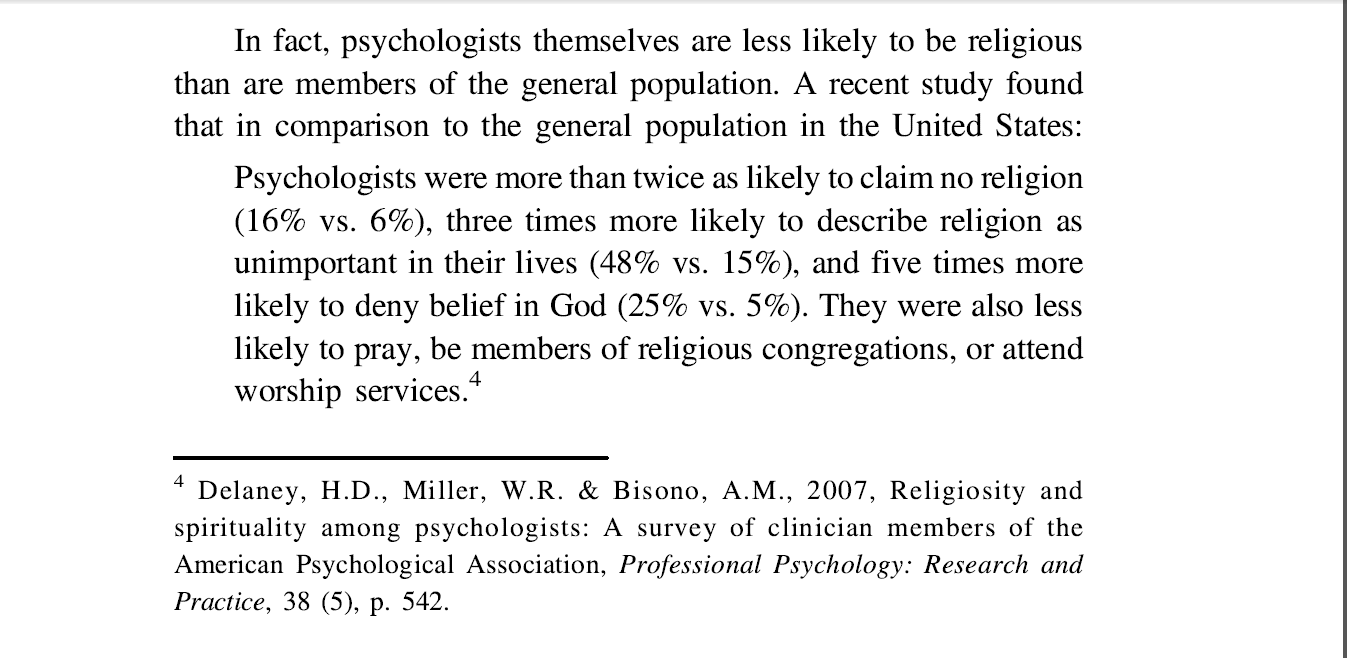
Answer: A) Because spirituality in this context encompasses a broad, personal meaning that does not necessarily include religion
Explanation:
In the text, spirituality is defined broadly, focusing on personal meaning, so people may identify as spiritual without adhering to organized religion.
Source: (p. 29)
——————————————————————————————
Belief: | Doctrine: |
What you personally think is true. | What an organization officially teaches is true. |
It comes from inside you. | It comes from outside you, like from a church, school, or political group. |
Example: “I believe there is life after death.” | Example: “The church’s doctrine says Jesus rose from the dead.” |
In one line:
Belief = personal idea
Doctrine = official teaching
Why might some people describe themselves as “spiritual but not religious” according to the text?
A) Because spirituality in this context encompasses a broad, personal meaning that does not necessarily include religion
B) Because they strictly follow church doctrines
C) Because they do not believe in any higher power or meaning
D) Because they only attend religious rituals
——————————————————————————————
Keywords:
1- Why might some people describe themselves as “spiritual but not religious” according to the text?:
- لماذا قد يصف بعض الناس أنفسهم بأنهم "روحانيون لكن غير متدينين" وفقًا للنص؟
- بۆچی ڕەنگە هەندێک کەس بەپێی دەقەکە خۆیان بە "ڕۆحی بەڵام ئایینی نییە" وەسف بکەن؟
2- Because spirituality in this context encompasses a broad, personal meaning that does not necessarily include religion
- لأن الروحانية في هذا السياق تشمل معنى واسعًا وشخصيًا لا يتطلب بالضرورة أن يتضمن الدين
- چونکە ڕۆحانیەت لەم چوارچێوەیەدا مانایەکی فراوان و کەسی لەخۆدەگرێت کە مەرج نییە ئایین بگرێتەوە
3- Because they strictly follow church doctrines
- لأنهم يتبعون عقائد (تعاليم) الكنيسة بصرامة
- چونکە بە توندی پەیڕەوی لە عەقیدەکانی کڵێسا دەکەن
4- Because they do not believe in any higher power or meaning
- لأنهم لا يؤمنون بأي قوة أو معنى أعلى
- چونکە باوەڕیان بە هیچ دەسەڵات و مانایەکی باڵاتر نییە
5- Because they only attend religious rituals
- لأنهم يحضرون الطقوس الدينية فقط
- چونکە تەنها بەشداری ڕێوڕەسمی ئایینی دەکەن
3. Both religious and spiritual
Someone might say: “I pray every day, read my holy book, and also feel a very personal relationship with God. My religion gives me deep meaning.”
They combine:
Organized practices and community worship (religious)
With personal feelings of connection, inner transformation, or divine presence (spiritual).
——————————————————————————————
4. Neither religious nor spiritual
Someone might say: “I don’t believe in God, I don’t follow any religion, and I don’t think much about spiritual questions.”
They may instead find meaning in human relationships, work, or other secular aspects of life.
1. Spiritual but not religious (SBNR)
Someone might say: “I don’t go to church or follow any religion, but I feel deeply connected to nature and the universe. I meditate and believe everything happens for a reason.”
They might:
Practice mindfulness or yoga for inner peace.
Reflect on life’s purpose or morality without linking it to a deity or scripture.
Say things like, “I believe there’s a higher power, but I don’t believe in organized religion.”
——————————————————————————————
2. Religious but not spiritual
Someone might say: “I go to church every Sunday, follow all the rituals, and do it because it’s tradition. But I don’t feel a personal spiritual connection.”
They might:
Participate in religious customs more out of habit, family expectations, or community belonging.
Focus on following external rules, but not think deeply about personal faith or meaning.
Example: Someone who attends services and observes all rituals but admits they don’t really believe or feel moved by it.
3. Both religious and spiritual
Fatima wakes up before dawn to pray. Each prayer fills her with peace and a sense of closeness to God.
She studies her holy book, attends mosque gatherings, and finds joy in teaching children about her faith.
“My religion isn’t just a set of rules,” she says. “It’s how I find purpose and how I keep my heart connected to God every day.”
——————————————————————————————
4. Neither religious nor spiritual
Lucas is a software engineer who values logic and evidence above all.
He doesn’t believe in gods, spirits, or an afterlife. When people talk about “the universe having a plan,” he shrugs.
“I think life is what you make of it,” he says. “I find meaning in my work, my friends, and enjoying the little moments. I don’t need anything spiritual.”
1. Spiritual but not religious
Amira loves to hike in the mountains. When she stands on a cliff and looks out over the valley, she feels something profound — like she’s part of something bigger.
She reads books about mindfulness and enjoys meditating.
When people ask if she believes in God, she says:
“I don’t follow any religion, but I do believe there’s a kind of energy that connects us all. I’d say I’m spiritual.”
——————————————————————————————
2. Religious but not spiritual
Joseph was raised in a very traditional household. Every Sunday he goes to church, stands when everyone stands, sits when they sit, and recites all the prayers.
But privately he admits:
“Honestly, I don’t really feel anything when I’m there. It’s just what my family expects. I’d feel guilty not going, but I don’t think much about faith or the deeper meaning.”